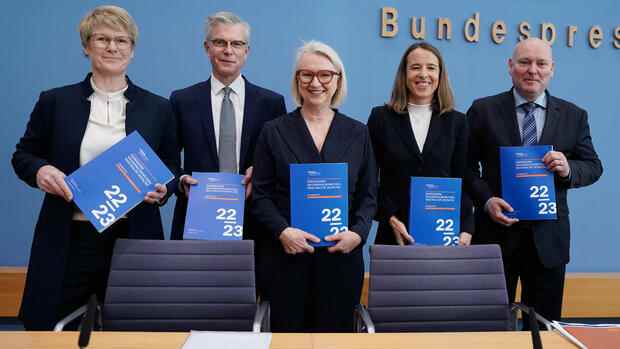In its latest report, the Advisory Council advocates an increase in the top tax rate or an energy bonus for higher earners.
(Photo: IMAGO/Political Moments)
Inheritance tax will be quietly increased by valuing inherited real estate higher from the beginning of 2023. In its latest report, the Advisory Council advocates a higher top tax rate or energy solos for higher earners.
Finally, many politicians are shouting, the topic of tax increases is back on the table. And left-wing economists, such as Achim Truger, claim with a view to countries like France that we still have potential for higher burdens. We could also use the OECD average or countries like Spain, where the tax burden is lower than in Germany, as a guide. What could speak for higher taxes in Germany?
The debt of the state is apparently not. According to the assessment of the German Council of Economic Experts, it does not pose a problem. In its report, it emphasizes that the sustainability of German public finances is not at risk and that the strong nominal economic growth is leading to a falling debt ratio despite the high level of net borrowing. The state is one of the big inflation winners.
Capital formation should be encouraged
Higher future government spending is foreseeable. Think of the modernization of the Bundeswehr and the energy transition. However, these could easily be financed by prioritizing public spending accordingly. After all, 57.5 percent of federal spending is for redistribution, with more than 13 percent going abroad, according to the IfW Kiel. The expenditures of the federal ministries have not only been growing faster than economic output since the traffic light.
Top jobs of the day
Find the best jobs now and
be notified by email.
Despite the recent rise in interest rates, the state’s financing costs are well below the long-term average. Instead of investing this savings or paying off debts, politicians have continued to expand the welfare state since 2009. The state does not lack money, but politicians lack the will to use the money properly.
Or does it have to be about creating more justice with higher taxes? Even before Corona, Germany was the country where inequality was most clearly corrected with taxes and levies. After redistribution, Germany is one of the countries with the lowest inequality, according to data from the Bank for International Settlements. So no need to redistribute any more.
Daniel Stelter is the founder of the discussion forum beyond the obvious, which specializes in strategy and macroeconomics, as well as a management consultant and author. Every Sunday his podcast goes online at www.think-bto.com.
(Photo: Robert Recker/ Berlin)
When it comes to wealth, things are different. However, this is not because our rich are particularly rich. But because the broad masses have hardly any assets. According to the Credit Suisse Global Wealth Report, relative to economic output, private households have fewer assets than in France, Italy and Spain. More redistribution doesn’t change that.
Political sign for more solidarity?
Instead, wealth creation should be promoted. Due to the protection of business assets, higher inheritance taxes do not lead to less, but to higher inequality and make inheritance tax more and more a “dumb tax”.
Could higher taxes dampen inflation? You have to deny that too. Higher taxes for higher earners are unlikely to reduce their propensity to consume, while higher taxes for companies will reduce their propensity to invest and thus increase supply.
So what’s the rationale? One can understand higher taxes like the Council of Economic Experts as a political sign for more solidarity, despite the fact that we are already redistributing more than ever before. The willingness of the payers to accept this will continue to decrease in view of the political priorities in the use of the funds.
More Handelsblatt articles on taxes:
To put a time limit on the tax increase, as the economists are proposing, shows political naivety. The solidarity surcharge is still due three decades after reunification, as is the sparkling wine tax, although the imperial fleet that was originally financed with it has long since sunk.
The state has had enough. Instead of philosophizing about tax increases, it’s time to modernize the tax and levy system and ask what the state can do without. The list of savings opportunities is long. Let’s start with the expansion of the Chancellery in Berlin for almost 800 million euros.
Daniel Stelter is the founder of the discussion forum beyond the obvious, which specializes in strategy and macroeconomics, as well as a management consultant and author. Every Sunday his podcast goes online at www.think-bto.com.
More: Lindner promises economy: no further burdens
